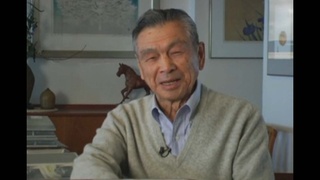Interviews
Growing up with both Japanese and American influences
At home we spoke Japanese, as I say, my mother was a Japanese school teacher and she was very strict, in a positive way. And my father was not as strict, but he had a big collection of books by Miyamoto Musashi, he was a legendary samurai and he told me many stories about Miyamoto Musashi, and it became part of my life.
Like for instance, like he always says: as a samurai, you never draw your sword to show off, all you do is train, and only when you’re in a corner and you have no where to turn, then you draw your sword with confidence to win or die with honor. And that type of, you might say, bushido training I got from my dad. And as I was studying a little at…when I graduated from high school, another kendo teacher gave me two daggers and that was the high school president, he says these are the seppuku or hara-kiri daggers, and if you ever commit a dishonor, you know what to do with it. Well I was chicken, I hate blood, so I have that on display at my house and I always remind me to be straight. [laughs]
So those are the type of training I got at home. But in school now it’s the other way around it’s completely Americanized, friends are all Americans, and Niseis too and sports activities, the scouts…well anything to do, just the typical junior high, high school, life of any other Americans so you might say I got a good balance of both culture and at that time I thought nothing of it, just a normal way of growing up, but now that I look back, I did get a little of both cultures.
Date: March 25, 2005
Location: California, US
Interviewer: Sojin Kim
Contributed by: Watase Media Arts Center, Japanese American National Museum







